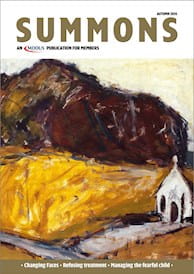IN these most tumultuous of times, the concept of judgement has been much on my mind. I make no comment on recent political events but, as I listened with increasingly wide eyes to the latest twist in an epic saga of tribalism and ambition, the theme of judgement has recurred.
Judgement is integral to healthcare practice. No matter how much medical students might wish it were otherwise, clinical practice cannot be definitively captured by a list of learning objectives, however enormous and far-reaching. On qualification, the messy and ambiguous realities of clinical practice can be startling and discomforting. The place of judgement quickly becomes apparent, even to those who have denied and resisted it as undergraduates. Yet judgement is itself a layered and complex concept which warrants further exploration.
Judgement is the essence of ethics. It resides in situations that are often contested and where there are multiple possible ways to proceed. Judgement is the tool of choice where discretion exists. Sociologists characterise the professions as occupational groups that self-regulate and enjoy discretion over specialist knowledge and expertise. Discretion is often concerned with the moral dimensions of care. Daily questions such as what constitutes sufficient information for a particular patient to make a meaningful choice and give consent or how to work with families who disagree about the best course of action for an incapacitated individual are ethical choices in which discretion is embedded.
Recognising these as questions of ethics, and therefore judgement, is important in itself: accepting that equally wellmotivated and well-qualified individuals can reach different judgements. By acknowledging discretion, one also becomes aware of relative power in therapeutic relationships. The discretion often rests, albeit unarticulated, with the professional. Its implicit nature depends on differential knowledge and occurs in an environment where emotions are unequally distributed. Openness about discretion, and therefore judgement, in clinical practice provides support to colleagues: it creates space for reflection and permission for discussion about difference. It allows for exploration of difficult features of clinical practice such as uncertainty and risk.
Judgement, or more accurately its absence or misdirection, is a concern in professionals. To show poor judgement is an indictment on someone’s competence or suitability for a role. In recent weeks, politicians’ careers have been derailed by that most damning of assessments: he or she lacks judgement or showed poor judgement in something said or done. What does this mean? If judgement is about discretion and is naturally required when a situation is contested or uncertain, does poor judgement or a lack of judgement mean anything other than someone has acted in a way that differs from that which we would have done?
What we choose to include, emphasise or omit when explaining treatment options may reflect, often unconscious, our own preferences and beliefs...
There seem to me to be two examples that suggest that criticisms about absent or poor judgement are more than merely disagreements. The first example occurs when someone appears not to recognise that they are operating in the arena of discretion at all: situations in which individuals speak or act without appearing to notice that they are within the realm of judgement. It is an absence of care and of thought that matters most, not the decision or choice that an individual has made. The inability to recognise that judgement is required is, in itself, important; as is the capacity to demonstrate that one is making a choice in the context of discretion and with regard to those who may do differently.
The second example is when facts elide with values or preferences without acknowledgement, leading to claims that are overblown, excluding or unsustainable. We are all susceptible to mixing questions of knowledge with our values and preferences, especially when seeking to persuade others. Statements about what constitutes ‘futility’ may be a composite of clinical information and experience coupled with beliefs about quality of life. What we choose to include, emphasise or omit when explaining treatment options may reflect, often unconscious, our own preferences and beliefs, perhaps particularly if we or someone we love have had similar experiences.
Even that which is represented as knowledge is underpinned by values to some extent: the research that is funded and the evidence of which care is predicated reflect the priorities and choices of organisations and individuals. That is inevitable, but judgement depends on recognising the limits of knowledge, the place of interpretation and being honest about the implications of the same. Where facts and values collide without insight or openness, judgement may be impaired or even said to be absent.
Judgement then is unavoidable. Whether in referenda or the clinic, it is a necessary, challenging and significant part of the choices and decisions we take. The real risk with judgement is that we fail to recognise its importance: that we thoughtlessly place our cross, literally or metaphorically, in a box without realising that matters of judgement cast long shadows.
Deborah Bowman is Professor of Clinical and Mental Health Ethics at The Tavistock and Portman NHS Foundation Trust
This page was correct at the time of publication. Any guidance is intended as general guidance for members only. If you are a member and need specific advice relating to your own circumstances, please contact one of our advisers.
Read more from this issue of Insight

Save this article
Save this article to a list of favourite articles which members can access in their account.
Save to library